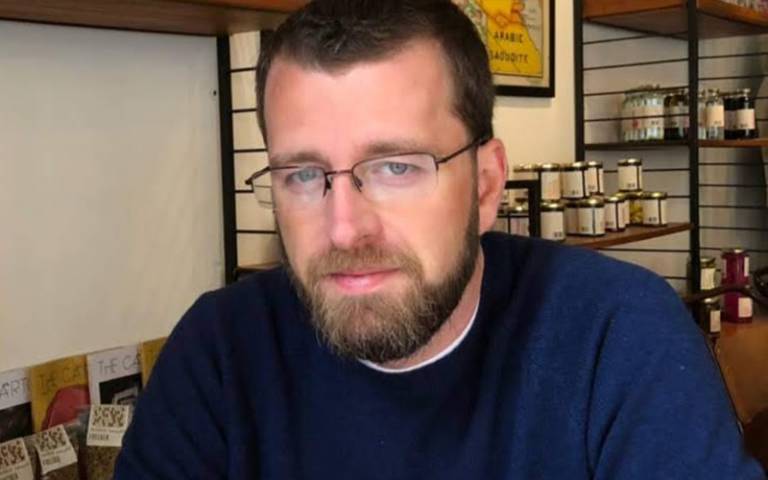STEaPP Spotlight on... Dr Jesse Sowell
6 July 2020

How long have you been at STEaPP? What does your role involve?
I joined STEaPP in June 2022. As a Lecturer in Internet Governance and Policy, my research and teaching focus on how we, as a society, manage the Internet’s infrastructure and how Internet communication transforms our social, political, and economic lives. In my role as a member of the Digital Technologies Policy Lab, my research will continue to focus on governance, policy, management, and security issues related to the Internet’s infrastructure, while also expanding to explore issues of platform and data governance, and disinformation. In Term 1 of 2022, I will be teaching the Foundations in Digital Technologies and Policy course in the MPA in Digital Technologies and Policy.
What drew you to STEaPP and UCL?
One of the biggest factors drawing me to STEaPP is the distinctly interdisciplinary approach to research and teaching. My work is closely aligned with STEaPP’s mission, focusing on bridging the gaps between the communities that manage complex engineering systems such as the Internet, and government actors tasked with protecting the public good. UCL is a great fit because it is a genuinely global university with a distinct focus on research impact. I could not ask for a combination of department and university better fit for the global, interdisciplinary character of my work and teaching!
How does your research feed into your teaching (and vice versa)?
The theories and concepts that help us understand Internet governance, policy, and security can get rather dry, rather quickly. My on-the-ground work with the people and organizations that ensure the function and security of the Internet’s infrastructure provides tangible insights into the role of local, regional, and global communities managing one of the least visible infrastructures we rely on every day. Presented through the lens of cooperation within and across transnational communities and common resource management, these relationships are then generalized to understand the challenges facing the management, governance, and regulation of complex, transnational engineering systems in general.
For instance, my work characterizes Internet governance and security challenges faced by these communities in terms of challenges faced by many complex engineering systems: managing risk and uncertainty, distributed rule- and decision-making, and maintaining the capabilities and capacities necessary for ongoing development. Domain-specific challenges facing the Internet’s infrastructure include malware, denial of service, equitable access, privacy and surveillance, platform governance and antitrust issues, and disinformation, to name a few.
What inspires you?
The scope, scale, and magnitude of the infrastructures we depend on every day absolutely require creative, cooperative solutions. I am inspired by the sociotechnical cultures that have developed innovative ways to cooperate across national and firm boundaries to manage the digital infrastructures we all rely on. These innovations range from the kinds of cooperation necessary to develop the early Internet to enterprising technical and governance innovations that have expanded access to digital communications in underdeveloped regions often ignored by conventional industry actors. It is inspiring to see the diverse kinds of cooperative information and knowledge sharing that have made the Internet a successful global infrastructure. For me, this is technology at its best: creating new opportunities for cooperation, understanding, and communication, in service of a common good.
What achievements are you most proud of?
Two of the achievements I am most proud of are my contributions to outreach in the anti-abuse community and seeing the successes of students formerly intimidated by Internet governance and cybersecurity topics. From 2016 to 2018 I had the privilege of working with two of M3AAWG’s Board Chairpersons and two executive directors to reboot M3AAWG’s outreach efforts. Working with these and other experts and practitioners, we developed anti-abuse communities in Latin America and the Caribbean, Japan, and Africa.
In my teaching, I am always happy to help students dig into contemporary, wicked Internet governance and cybersecurity challenges. I enjoy seeing them get excited about the prospects of getting involved in governance and cybersecurity issues on the ground, and I am especially proud of their achievements when they apply what they have learned to make a difference in the real world.
Who influenced you?
A common theme across my mentors in my PhD work was to respect the time, effort, and experiences of the individuals I worked with through fieldwork and interviews. Mentors’ advice included: be open to diverse narratives; immerse yourself in these actors’ diverse experiences; leave the dialog open for actors to express not just what you are looking to understand about the mechanics of sociotechnical governance but be open to share their experiences as meaningful and impactful in and of themselves. The advice from my mentors, and what I learned from research subjects by following that advice, has substantively influenced not only my image of research ethics and integrity but also how I approach my day-to-day life.
If you could give one piece of advice to your teenage self, what would it be?
Slow down, don’t take everything so seriously. Worry less about the closed-form solution and be more creative, even if it isn’t a sure thing. Now is the best time to make those stupid yet highly educational mistakes. You will have plenty of time to agonize over minutiae later in life!
What piece of advice would you like to give to a student?
Being systematic, rigorous, and creative can create tensions, but go hand-in-hand when doing innovative research. Moreover, all three are absolutely necessary to understanding and innovating at the intersection of policy and complex engineering systems. Spend some time understanding the foundations for methods in philosophy of science and technology, then go be creative. And have fun doing it!
Homework reading: Kuhn’s Structure of Scientific Revolutions
What three words would you use to describe STEaPP?
Dynamic, interdisciplinary, creative.
 Close
Close

